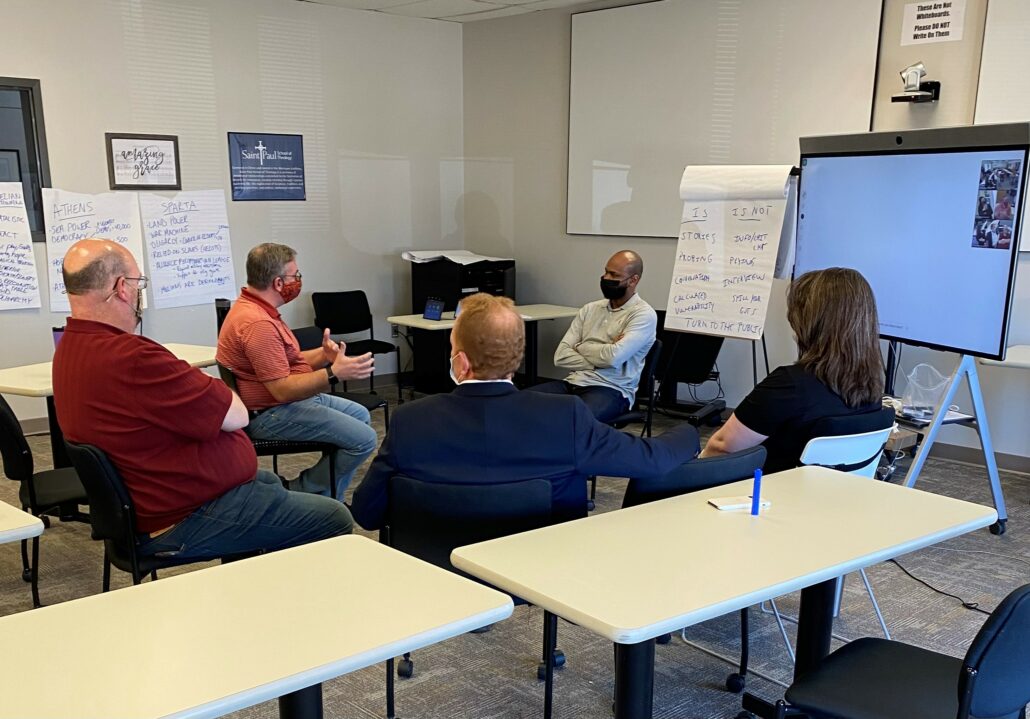
DMin Students Gain Ministry Experience Through Partnerships
Sharing the love of God with the world becomes more challenging during unsettled times. Ministers must find creative approaches for leading congregations through periods of rapid change and intense polarization between communities.
One of the best ways to imagine new approaches is through collaboration. At Saint Paul School of Theology, our Doctor of Ministry program connects students with leaders from the Industrial Areas Foundation (IAF) and United Methodist Church of the Resurrection. These partnerships enable students to sharpen their skills by working with those who have walked a similar path.
Jonathan Bell, Leadership Resources Specialist with Resurrection, views his church’s partnership with Saint Paul as “similar to the relationship between a university medical school and teaching hospital.”
Along with a world-class theological education, students gain practical ministry experience alongside best-in-class practitioners in one of the denomination’s most vital and outwardly focused churches, Bell explains.
Industrial Areas Foundation (IAF)
Paul Turner has worked for the Industrial Areas Foundation for over 25 years and currently serves as a regional supervisor.
The IAF has existed in the United States since 1940 and has over 50 affiliates across the U.S. and around the world. As the nation’s largest and longest-standing network of local faith and community organizations, IAF brings together congregations, nonprofits, civic groups and unions for citizen-led action for positive change.
Through working with IAF, DMin students learn innovative ways to equip families and communities with the power to participate in public decisions that impact their lives. IAF helps leaders develop the capacities and skills they will need to effectively serve congregations and communities. Students also engage in the core relational practices taught by the IAF, including 1-1 relational meetings and small group house meetings.
IAF has provided national leadership training for Saint Paul students on two different occasions. First, students develop a firm grounding in the principles and practices of broad-based organizing and democratic decision making. Second, IAF “exposes students to intersectionality between democratic values and the role of the faith traditions in the American democratic experiment,” Turner explains.
Church of the Resurrection
Church of the Resurrection in Leawood, Kansas offers a number of ministries focusing on racial justice, LGBTQ+ communities and protecting our environment.
Through its Vision 2030 strategic plan, the church is working for a Kansas City that looks more like the Kingdom of God. To close the “Justice & Kindness Gap,” church leaders bring people together across faiths to tackle issues like homelessness and mental health. Another objective is to close the “Opportunity Gap” by breaking the cycle of child poverty. The church is working to increase access to pre-k education, alleviate child hunger and ensure that all children have access to basic health care.
Saint Paul faculty and church leaders work together at the doctoral level through joint instruction and major training events. Resurrection’s Senior Pastor teaches a course in the DMin program. Students participating in the church’s Leadership Institute have the opportunity to engage in higher level scholarship, critical thinking and leadership.
Saint Paul faculty have also taught Resurrection members in a church-wide lay academy. “Saint Paul has provided a right-at-hand, go-to seminary for Resurrection’s persistent efforts to raise up and encourage young candidates for ordained ministry,” Bell says.
Gaining Practical Ministry Experience
Through collaborations with IAF and Resurrection, DMin students deepen their theological understanding while building crucial ministry skills.
Turner notes that training with IAF provides both the theoretical framework for and grounding in the practical applications of institutional organizing. “Students learn how to think about the application of power, the role of interests, the qualities of leaders we seek and the important differences between our public and private relationships as they move into full time ministry.”
Leading a thriving ministry also involves day-to-day responsibilities like financial matters, strategic planning, human resources policies, staff management and organizational development. Ministers must become adept at working with volunteers and using technology effectively. Events like weddings and funerals offer unique opportunities for reaching non-religious guests who may never enter a church otherwise. Collaborating with Resurrection, Bell points out, exposes students to best practices in all of these areas and more.
Building Welcoming Faith Communities
With the majority of mainline Christian churches experiencing declining attendance, faith leaders must find opportunities to plan ministry with non-believers in mind. Resurrection, for example, is currently receiving new members regularly throughout the year, about two-thirds of whom were not previously involved in a church.
Through collaborative work with Resurrection, doctoral students experience purpose-driven, strategically led, outwardly-focused ministry in a local church that is impacting its community both pastorally and missionally.
“From our successes and failures,” Bell notes, “[students] learn not only best practices in areas such as evangelism, worship, pastoral care, discipleship and administration, but also the character, attitude and principles required to conduct ministry with excellence.”
Preparing for Effective Leadership
By working closely with our dedicated faculty and leaders from our partner organizations, Saint Paul doctoral students gain the theological background and hands-on experience they need for innovative ministry. Students also engage in deep reflection and research that prepares them for leading communities for social justice ministries.
If you are interested in joining the Doctor of Ministry program, you may apply online at any time. If you have any questions, please contact our Admissions office at or 913-253-5084.
